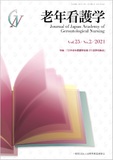Japanese
English
- 販売していません
- Abstract 文献概要
- 参考文献 Reference
抄録
本研究は,特別養護老人ホーム(以下,特養)における夜間のオンコール体制に着目し,オンコール時における看護師の判断と対応の詳細を明らかにすることを目的とした.従来型特養に3年以上勤務する看護師6人を対象に半構造化面接を実施し,質的記述的に分析した.オンコール時の看護師は,≪目の前にいない利用者の不調の原因を探る≫≪利用者の不調が朝まで様子をみてもいい状態か検討する≫≪判断がつかないため利用者の安全が最優先される対応をとる≫など,【利用者の安全と安楽を守るための判断と対応】を行うと同時に,≪冷静に対応できるような助言をする≫≪介護職の業務に支障が出ないように考慮する≫など,介護職が安心して業務を遂行できるよう【ケアを担う介護職をサポートするための判断と対応】も行っていた.特養の看護師は夜間オンコール時,介護職との電話でのやり取りを通して利用者の安全と安楽を守る判断を行うとともに,ケアを担う介護職にも配慮するという特徴が見いだされた.
This study focused on the nighttime on-call system of intensive-care home for the elderly and describes in detail the judgments and support of nurses receiving calls from healthcare workers. Semi-structured interviews were conducted with 6 nurses who had> 3 years of working experience in conventional intensive-care homes, and the contents were analyzed qualitatively and descriptively. The following two themes were identified : (i) nurses tended to make judgments and give support to ensure the safety and comfort of the care recipients ; (ii) nurses tended to judge and take action to support healthcare workers. Nurses sought the causes of sickness that were not clearly evident in the sick recipients, determined whether the sick care recipients could be monitored until the following morning, and prioritized their safety in cases where reaching a judgment was difficult. Simultaneously, nurses were careful to ensure a safe working environment for healthcare workers. In particular, nurses provided advice to ensure that healthcare workers could calmly respond and exercised consideration to ensure that they did not face inconvenience in performing their duties. The characteristics of the nurses' judgment and response were that they made decisions to protect the safety and comfort of the care recipients by relying on information provided via telephone during the night on call and supported healthcare workers who actually took care of the care recipients.
Copyright © 2021, Japan Academy of Gerontological Nursing All rights reserved.


